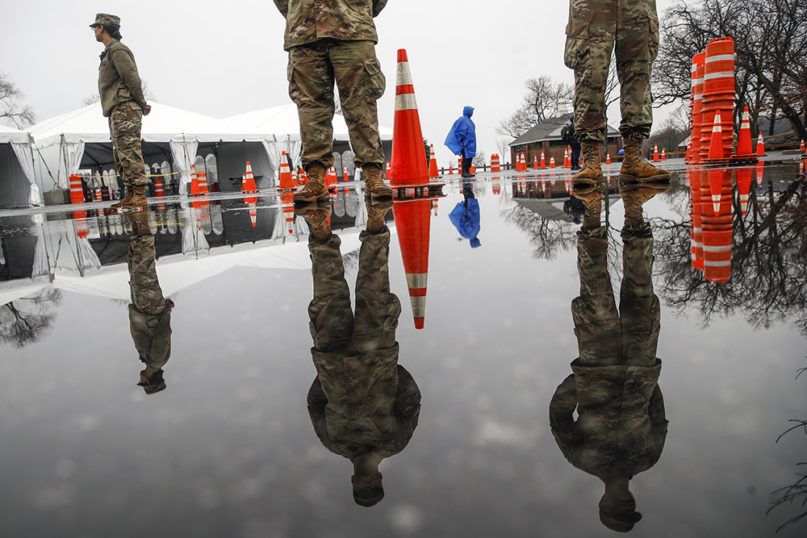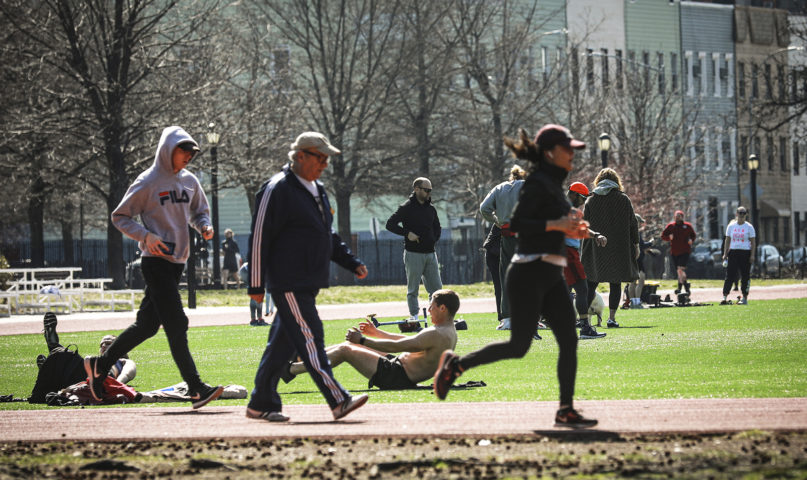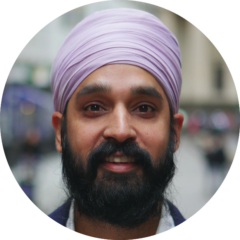(RNS) — I live with my family in Manhattan, now the epicenter of the Covid-19 outbreak in the United States. As is true of many Americans, our lives have changed dramatically since going into self-quarantine last week — we’re well but are social distancing.
None of these changes has been easy. We have young kids at home who require constant attention. My partner is a physician, so she has been busy preparing for the pandemic in a way that most others haven’t. We spend a vast majority of our time in our tiny apartment, only stepping out occasionally for short bursts of exercise or fresh air.
Things that seemed so important 10 days ago have been pushed to the sideline: emails, writing projects, travel, social media, teaching. This seems true for everyone I know. COVID-19 has disrupted our lives in a way that we never imagined possible.
While I see the pandemic as a disruptive force, I also try to see it through the rose-colored prism of chardi kala, the Sikh teaching of ever-rising optimism. Sikh wisdom offers chardi kala as an antidote to suffering. We all encounter various difficulties in life, and we can’t control everything that comes our way. But we can always choose how we perceive these events — and it’s far more empowering and inspiring to find the silver linings in the difficulties we experience.
It’s not an easy practice, especially in times like these. But engaging chardi kala has helped me in a number of ways throughout my life: to see the humanity of those who hate people who look like me (or who look different at all), to find goodness in moments of darkness and to find hope in seemingly hopeless situations.
Employing the outlook of chardi kala, I have tried to view this moment as something more than a deadly and inconvenient disruption. And over the past week, I have come to see it as a helpful intervention.

National Guard personnel stand at attention as they wait for patients to arrive at a COVID-19 coronavirus testing facility at Glen Island Park, Friday, March 13, 2020, in New Rochelle, N.Y. (AP Photo/John Minchillo)
Here’s a simple example of how:
All of those things that seemed so important a week ago — getting reservations at the new restaurants, beating rush hour traffic, receiving our packages within 24 hours — all those things are revealed for what they are now. I don’t say this to minimize these things or say they don’t matter. Of course they do. But when we lose perspective, we let things like this occupy more of our mental space than they deserve.
Catastrophes can be helpful in bringing perspective.
In the context of an international pandemic, the smaller things take a back seat to our top priorities of staying safe and caring for our kids.
Here’s the funny thing about the above sentence. We all believe it to be true. We all pay lip service to the idea that our well-being and the well-being of loved ones is at the top of our priority list. But at the same time, how many of us actually live in that manner? How many of us match up who we claim to be with what we actually do?
If you asked me a week ago how my life aligned with my priorities, I would have responded with a small shrug, saying that I tried to keep these things aligned and felt like I was doing a pretty good job.
It’s only when our backs are up against the wall and we are truly forced to make tough decisions that we realize where our real priorities are. This may seem like an obvious point, one that I could have easily said a week ago. But the force of it is empty until we truly put it into practice.
For me, this past week has been a remarkably clarifying intervention. It has revealed to me who I am at my core and what is truly most important to me. In normal times, of course, I enjoy spending time with my girls every day, but if I’m being honest, most of my time every day goes toward my job; if our lives are a sum of what we do every day rather than what we say, then anybody watching me from above would say my number-one priority is work.
And the sad reality is that I’d have little evidence to prove otherwise.
The pandemic’s disruption to our lives has forced me to choose what’s most important. And every moment of every day has reinforced for me what that is — the health and safety of my family. Focusing on these priorities these past weeks has helped me live by my priorities in a way that I haven’t for far too long.
The remarkable thing I’m noticing is that this isn’t just true for me. As I look around a world in crisis and watch how people are responding similarly, it tells me something about our shared humanity, a set of fundamental desires that ties us all together. We all want to be safe. And we all want our families to be safe.
Sometimes, life’s greatest lessons are the most obvious. Jarring moments like these can jolt us back into reality and help us regain perspective. They can also force us to ask ourselves how we’re doing in relation to how we want to be as people.
This is the intervention baked into the crisis ensuing from COVID-19. It’s a silver lining available to us all. The question that remains is how willing we are to see it.






